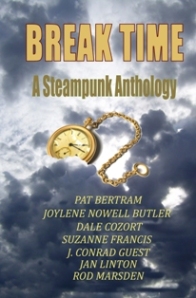 The theme of time travel is timely, considering that Break Time, the steampunk anthology I’ve been working on for the past two years with six other authors, is nearing publication. Yay!!
The theme of time travel is timely, considering that Break Time, the steampunk anthology I’ve been working on for the past two years with six other authors, is nearing publication. Yay!!I’ve always enjoyed the conundrum of time travel. In fact, Ray Bradbury’s story “The Sound of Thunder” is one of my all-time favorite short stories. (Hmm. Apparently I’m trying to use the word “time” as many times as possible.) When I first read Bradbury's story, I hadn’t yet studied chaos theory and the butterfly effect, but it seemed logical that one small change millions of years ago would make a difference to us today. Oddly, in the story, everything was still the same in our world after the misstep, though the language was different and a dictatorial candidate won the election instead of the more egalitarian choice. Despite that seeming contradiction, I enjoyed the story and the ensuing mind calisthenics. The way I figured it, since the changes were so minor, it’s just as possible that the dead butterfly affected the passage of the time machine rather than the passage of time itself, and the travelers ended up in an alternate universe.
In Millenium, another time travel film, the butterfly effect is countered by the theory that insignificant changes can be made that would not affect the whole, such as removing people who were about to die in an airplane crash and taking them to another world. (Who knows, maybe the butterfly in Ray Bradbury’s story was newly dead of natural causes, and all that was affected was an infinitesimally insignificant patch of compost.)
Once a long time ago, I read a story about sightseers from the future who came to watch catastrophes here on earth. (There are several movies with that same theme, but the story I read predated the films by decades.) The tourists could watch the unfolding drama, but could in no way interfere. I used to think that was inhumane, sort of like reporters who simply film the death throes of victims before help arrives without ever pausing to offer assistance. However, when I watched The Final Countdown, my sympathies lay with those who thought it important not to change history by attacking the Japanese before they attacked Pearl Harbor. Who are we to change what was? Sure, all those American deaths would have been prevented, but what other atrocities might have taken their place? Though people consider it a conspiracy theory, the fact is that Roosevelt knew about the attack and let it happen. (A strange aside. People always talk about the Americans having broken “The Purple Codes” but before they were called the purple codes, they were red and various other colors. They were so named because of the color of the folder in which they were stored, not because of any esoteric reason.) Roosevelt’s point was to get the uninvolved Americans into the war. And so, ultimately, many worldwide changes were brought about.
Perhaps the world is unfolding as is should. If so, would I, as a time traveler, have the obligation to leave things as they are? Or would I be part of the unfolding, perhaps the catalyst for the unfolding, and if I did nothing, my inaction would effect other changes? If I ever had to make such a decision, the decision would be made by not deciding. As the old poster from the 1960s proclaimed, “Not to decide is to decide.”
In Break Time, Alexander Giston’s wife and grown son are killed in a steam engine accident. He goes back in time to cajole them into taking another mode of travel. They agree, and this time, the aeroship they are in crashes. The third time, they take their own Stratosphere Steamer, the automobile of our particular steampunk era. And yep. It too crashes. This leads me to wonder if perhaps it’s impossible to change the past. If the past will always self-correct.
If you are a time travel buff, be on the lookout for Break Time. Meantime, check out “Time's Winged Chariot,” Rod Marsden’s phenomenal article listing time travel movies, books, comics, and television shows.
***
Pat Bertram is the author of the suspense novels Light Bringer, More Deaths Than One, A Spark of Heavenly Fire, and Daughter Am I. Bertram is also the author of Grief: The Great Yearning, “an exquisite book, wrenching to read, and at the same time full of profound truths.” Connect with Pat on Google+. Like Pat on Facebook.

No comments:
Post a Comment